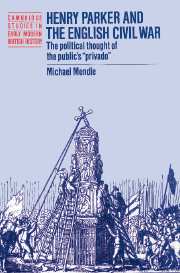Book contents
- Frontmatter
- Contents
- Preface
- Acknowledgments
- List of abbreviations
- 1 The public's privado
- 2 The ship money case and The Case of Shipmony
- 3 Religio laici
- 4 Observations and the political theory of the emergency
- 5 The Observator observed
- 6 “Vaine Confidence in the Law”: the Observator responds
- 7 Diverse urgent emergent considerations
- 8 Disputable and visible politics
- Conclusion: contrary points of war
- Appendix: The writings of Henry Parker
- Index
- Cambridge Studies in Early Modern British History
7 - Diverse urgent emergent considerations
Published online by Cambridge University Press: 08 October 2009
- Frontmatter
- Contents
- Preface
- Acknowledgments
- List of abbreviations
- 1 The public's privado
- 2 The ship money case and The Case of Shipmony
- 3 Religio laici
- 4 Observations and the political theory of the emergency
- 5 The Observator observed
- 6 “Vaine Confidence in the Law”: the Observator responds
- 7 Diverse urgent emergent considerations
- 8 Disputable and visible politics
- Conclusion: contrary points of war
- Appendix: The writings of Henry Parker
- Index
- Cambridge Studies in Early Modern British History
Summary
Parker's political and religious writings in the opening years of the Long Parliament and civil war will probably always be of first interest to his students; it is, after all, the Observator to whom they are drawn. Nevertheless, Parker's efforts on behalf of commercial interests and his later political and religious writings have received less attention than they merit. In the case of the commercial pamphlets, reasons are not hard to find: undoubtedly they are too mercenary for some tastes, and suffer (for casual modern readers) from immersion in the very details and circumstances that provoked their commissioning and made them effective. Less obvious is the general neglect of the later political and religious writings.
With the approach of war in 1642, Parker abandoned the religious pamphleteering that had occupied him in 1641–2. But in 1645, certainly, and in 1646, perhaps, he returned to this old stand.
Friend and foe judged William Laud more by his deeds than his words. Ironically, though, the crisis of his career was bracketed by two speeches and, it seems, Henry Parker set out to answer both of them. Divine and Politike Observations, which we have argued was possibly by Parker's hand, responded to Laud's speech in the Star Chamber at the trial of Prynne, Bastwick, and Burton; the archbishop's scaffold speech at his own execution in January 1645 was the other. Laud planned his final moment with care, leaving a text of his remarks with John Hinde, who used them and his own notes and observations to produce an authorized addition, so it was assumed, to the English martyrology.
- Type
- Chapter
- Information
- Henry Parker and the English Civil WarThe Political Thought of the Public's 'Privado', pp. 137 - 159Publisher: Cambridge University PressPrint publication year: 1995



